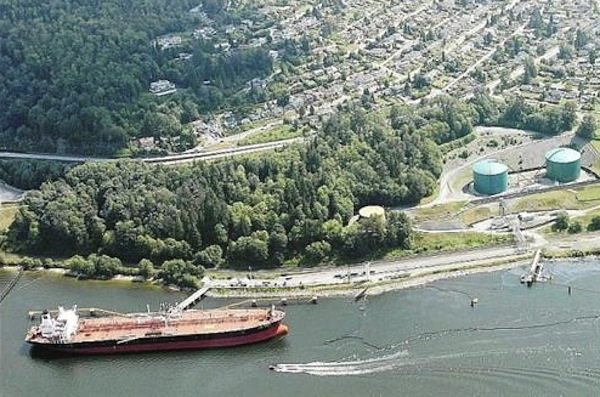“Don’t slam the door on trade” — my latest Vancouver Sun op/ed

I was invited to contribute another opinion column to the Vancouver Sun – here's the original link.
A bleak scenario has been painted by Vancouver Mayor Gregor Robertson in his quest to halt the increase of oil tanker traffic in Port Metro Vancouver. He imagines a broken hull of an oil tanker straddling a beach beside Stanley Park, oil fouling our shoreline and soiling birds and sea animals. It would be a calamity that blackens our city’s green image, chases away tourists and harms our economy, he says.
For his supporters, the mayor’s opposition is an environmental call to action; for his detractors, it amounts to an economic blockade of B.C.’s coastline. Oil tankers have safely navigated B.C.’s inland waterways for a half-century without incident. So far, Robertson has not raised concerns about current oil tanker traffic, so why sound the alarm when the shipments increase?
According to the mayor, the potential for an oil spill poses too much risk to Vancouver. Follow Robertson’s logic, and you only remove the risk by banning oil tankers from our port altogether.
Would British Columbians back a total ban on oil tankers, or are we looking for a more moderate approach?
Today’s polls do show strong public disapproval for oil supertankers on the west coast. However, what British Columbians really dislike is that we’re taking on most of the environmental risk, without getting the financial benefits neighbouring provinces now receive.
No one disagrees that safety is paramount. Our leaders must demand that before any oil is piped over land and pumped onto ships in our harbours the highest safety standards are met and even exceeded. There are real concerns, and we must listen to all stakeholders so we get it right.
When costs for our health care and education continue to rise, should we be asking if there’s a better deal for B. C.?
Surely that should be a top priority of our premier. On the matter of oil shipments, Christy Clark must occupy the middle ground abandoned by Vancouver’s mayor and the NDP opposition.
In recent days, Adrian Dix announced that he and his caucus are opposing Enbridge’s Northern Gateway pipeline proposal. This is a decision the B.C. NDP have made even though the National Energy Board Joint Review is still underway. Dix’s stance foreshadows what our province can expect under an NDP government — a hard line on any remotely controversial development and jobs and investment fleeing B.C. as a result.
On Northern Gateway, Adrian Dix has swept the possibility of a compromise off the table. Count on him to follow in the footsteps of his political ally in Vancouver city hall and also strangle any expansion of Kinder Morgan’s pipeline in the south.
As her government enters the final year of its mandate, Christy Clark must take bold steps on the energy file. The kind of deal that most British Columbians wish for is within her grasp, if she so chooses.
Clark must invite Prime Minister Stephen Harper, Alberta Premier Alison Redford, Saskatchewan Premier Brad Wall and representatives of Canada’s petroleum industry sector to tour Burrard Inlet to see first-hand what is at stake for B.C. There could be no better backdrop than our pristine coastline for this conversation.
Premier Clark must convince the western premiers that she is looking for the best deal for all of our provinces. Clark can point to the New West Partnership Trade Agreement (NWPTA, which succeeded the TILMA accord) our provinces signed as an example of where B.C., Alberta and Saskatchewan harmonized strategic objectives on trade and investment.
In order to stabilize the access to markets, British Columbia must be an equal partner. Premier Clark should therefore propose a Western Petroleum Export Accord that sees a fair share of oil industry profits invested in B.C.
Petroleum industry representatives already understand that without British Columbia’s cooperation, they’ve got little choice but to send oil at a deep discount to markets in the U.S. With billions at stake, they should be prepared to negotiate the terms of a deal with B.C.’s premier in good faith.
There was a time when the west was the nation’s breadbasket and our markets lay in Eastern Canada. Today, billions in Canadian tax revenue depend upon our resources getting onto ships to reach markets in Asia. For this reason, the prime minister must also be prepared to offer a better deal to B.C.
The quality of our health care and education system depend, in part, upon expanding markets for our oil resource. We know B.C. is taking on the risk, so how do we mitigate it? We know others will profit, so how can B.C. ensure that our hospitals, schools and universities are properly funded too?
Our leaders must ask what is the best possible deal for British Columbia and not slam the door on international trade as Gregor Robertson and Adrian Dix already have.


